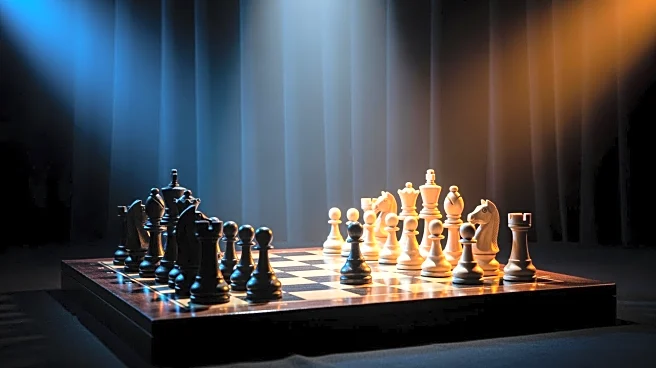What's Happening?
The Broadway musical 'Chess,' featuring music by Benny Andersson and Björn Ulvaeus of ABBA and lyrics by Tim Rice, has returned with a new version of Rice's book by Danny Strong. The story revolves around the Cold War chess rivalry between Freddie Trumper
of the US and Anatoly Sergievsky of the USSR, with Florence Vassy, played by Lea Michele, caught in the middle. This revival, directed by Michael Mayer, marks the third attempt to rework the material, incorporating historical context such as the SALT II treaty negotiations and the Abel Archer 83 military exercises. Despite the compelling human drama and strong musical performances, the production struggles with convoluted plotlines and inconsistent character motivations.
Why It's Important?
The revival of 'Chess' on Broadway highlights the ongoing interest in Cold War narratives and their cultural significance. The musical's exploration of geopolitical tensions through the lens of a chess match offers a unique perspective on historical events. Lea Michele's performance is a significant draw, showcasing her vocal prowess and stage presence. The production's attempt to integrate historical context into the narrative reflects broader trends in theater to engage audiences with complex political themes. However, the challenges in adapting the material underscore the difficulties in balancing historical accuracy with theatrical storytelling.
What's Next?
The future of 'Chess' as a Broadway staple remains uncertain, as the production continues to grapple with narrative coherence and audience engagement. The creative team may consider further revisions to enhance the clarity and impact of the story. Audience reactions and critical reviews will likely influence the show's longevity and potential adaptations. The involvement of high-profile actors like Lea Michele may attract more attention and drive ticket sales, prompting discussions on the viability of politically themed musicals in contemporary theater.
Beyond the Headlines
The revival of 'Chess' raises questions about the ethical implications of dramatizing historical events for entertainment. The portrayal of Cold War tensions through a chess match invites reflection on the role of art in shaping public perceptions of history. The production's focus on geopolitical symbolism rather than the intricacies of chess itself may lead to debates on the balance between artistic expression and factual representation. Additionally, the musical's evolution over time highlights the challenges of preserving artistic integrity while adapting to changing cultural contexts.















